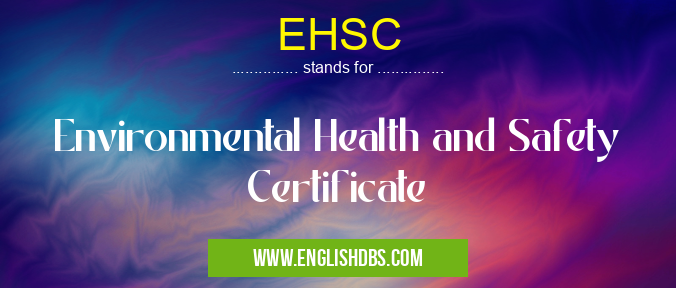What does EHSC mean in ENVIRONMENTAL
EHSC stands for Environmental Health and Safety Certificate. It is a certification that demonstrates an individual's knowledge and skills in protecting human health and the environment from hazards associated with environmental, health, and safety (EHS) issues.

EHSC meaning in Environmental in Governmental
EHSC mostly used in an acronym Environmental in Category Governmental that means Environmental Health and Safety Certificate
Shorthand: EHSC,
Full Form: Environmental Health and Safety Certificate
For more information of "Environmental Health and Safety Certificate", see the section below.
Purpose of EHSC
The primary purpose of EHSC is to ensure that individuals working in various industries, such as construction, manufacturing, healthcare, and environmental protection, have the necessary expertise to:
- Identify and assess environmental and health hazards
- Develop and implement effective safety programs
- Comply with EHS regulations and standards
- Protect the health and safety of workers, the public, and the environment
Benefits of EHSC
Obtaining an EHSC offers several benefits to individuals and organizations, including:
- Enhanced career opportunities and advancement
- Increased knowledge and skills in EHS management
- Improved safety performance and reduced risk of accidents
- Demonstrated compliance with EHS regulations
- Reduced environmental impact
Eligibility and Requirements
The eligibility criteria and requirements for obtaining an EHSC may vary depending on the certification program. Generally, individuals are required to have a background in environmental science, health sciences, safety management, or a related field. They may also be required to complete specific training courses and pass an examination.
Essential Questions and Answers on Environmental Health and Safety Certificate in "GOVERNMENTAL»ENVIRONMENTAL"
What is an EHSC?
An Environmental Health and Safety Certificate (EHSC) is a specialized credential that demonstrates an individual's knowledge and skills in environmental health and safety (EHS) principles and practices. It is designed for professionals working in various industries, including manufacturing, construction, healthcare, and government, who are responsible for managing and mitigating environmental risks and ensuring the health and safety of employees and the public.
Who should pursue an EHSC?
An EHSC is ideal for individuals who seek to advance their careers in the following fields:
- Environmental Health and Safety Management
- Occupational Safety and Health
- Industrial Hygiene
- Environmental Compliance
- Risk Assessment and Management
- Sustainability and Green Practices
- Environmental Consulting
What are the benefits of obtaining an EHSC?
Earning an EHSC offers several advantages, including:
- Enhanced knowledge and skills in environmental health and safety
- Improved job performance and career advancement opportunities
- Increased credibility and professional recognition
- Demonstrated commitment to environmental stewardship and workplace safety
- Eligibility for professional memberships and certifications
What are the requirements for obtaining an EHSC? A: The requirements for obtaining an EHSC vary depending on the issuing organization. Typically, candidates must meet the following criteri
The requirements for obtaining an EHSC vary depending on the issuing organization. Typically, candidates must meet the following criteria:
- Hold a bachelor's degree in a relevant field
- Have a minimum number of years of work experience in EHS
- Pass an examination that covers EHS concepts and practices
Where can I obtain an EHSC?
Numerous organizations offer EHSC programs, including:
- American Board of Industrial Hygiene (ABIH)
- National Environmental Health Association (NEHA)
- American Society of Safety Professionals (ASSP)
- International Society of Sustainability Professionals (ISSP)
Final Words: An EHSC is a valuable certification for individuals seeking to advance their careers in the EHS field. It provides them with the knowledge and skills necessary to effectively manage environmental and health hazards, ensuring the health and safety of individuals, the public, and the environment. By obtaining an EHSC, individuals demonstrate their commitment to EHS best practices and ethical environmental management.
